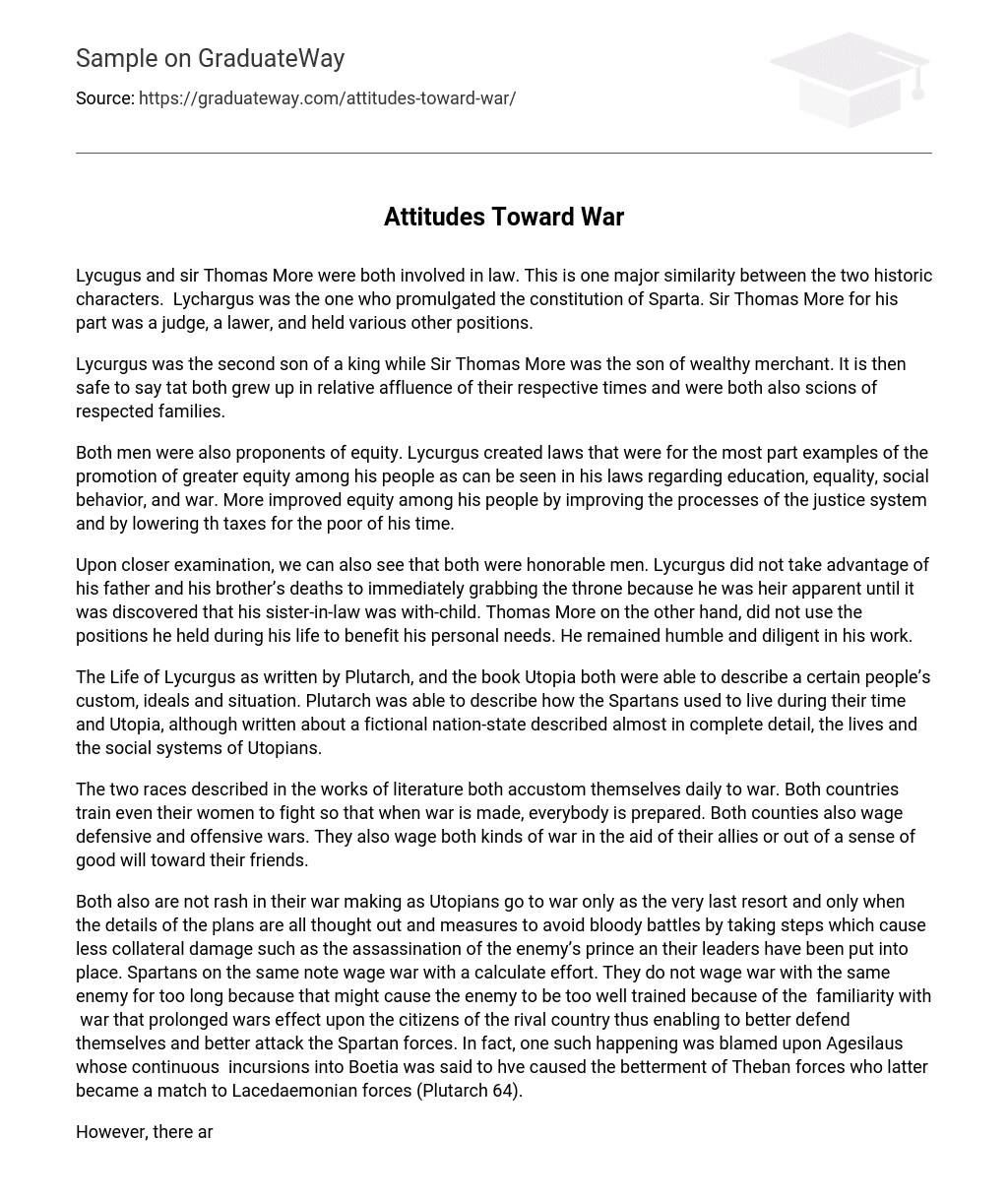Lycugus and sir Thomas More were both involved in law. This is one major similarity between the two historic characters. Lychargus was the one who promulgated the constitution of Sparta. Sir Thomas More for his part was a judge, a lawer, and held various other positions.
Lycurgus was the second son of a king while Sir Thomas More was the son of wealthy merchant. It is then safe to say tat both grew up in relative affluence of their respective times and were both also scions of respected families.
Both men were also proponents of equity. Lycurgus created laws that were for the most part examples of the promotion of greater equity among his people as can be seen in his laws regarding education, equality, social behavior, and war. More improved equity among his people by improving the processes of the justice system and by lowering th taxes for the poor of his time.
Upon closer examination, we can also see that both were honorable men. Lycurgus did not take advantage of his father and his brother’s deaths to immediately grabbing the throne because he was heir apparent until it was discovered that his sister-in-law was with-child. Thomas More on the other hand, did not use the positions he held during his life to benefit his personal needs. He remained humble and diligent in his work.
The Life of Lycurgus as written by Plutarch, and the book Utopia both were able to describe a certain people’s custom, ideals and situation. Plutarch was able to describe how the Spartans used to live during their time and Utopia, although written about a fictional nation-state described almost in complete detail, the lives and the social systems of Utopians.
The two races described in the works of literature both accustom themselves daily to war. Both countries train even their women to fight so that when war is made, everybody is prepared. Both counties also wage defensive and offensive wars. They also wage both kinds of war in the aid of their allies or out of a sense of good will toward their friends.
Both also are not rash in their war making as Utopians go to war only as the very last resort and only when the details of the plans are all thought out and measures to avoid bloody battles by taking steps which cause less collateral damage such as the assassination of the enemy’s prince an their leaders have been put into place. Spartans on the same note wage war with a calculate effort. They do not wage war with the same enemy for too long because that might cause the enemy to be too well trained because of the familiarity with war that prolonged wars effect upon the citizens of the rival country thus enabling to better defend themselves and better attack the Spartan forces. In fact, one such happening was blamed upon Agesilaus whose continuous incursions into Boetia was said to hve caused the betterment of Theban forces who latter became a match to Lacedaemonian forces (Plutarch 64).
However, there are also marked differences between the two races. One is the utter dislike that the Utopians have for war and the apparent glorification og feats of war in the Spartan culture. Although it has been earlier said that Utopians wage defensive and aggressive war against their enemies, they believe that there is no real honor to be had in war and bloody victory. They instead celebrate victories which they win through no feat of arms and only by dexterity and good conduct. This is because they believe that the fierceness involved in war is not the nature of man. Therefore they celebrate victories won in the fashion that only man and no other living creatures can do.
The Spartans on the other hand were very warlike. They train their children from a very young age in the rigors of war-making and are taught to rejoice in military victories and feats of strength.
From a very tender age until they are thirty, the men of Sparta devote themselves almost entirely to war and the study of military arts. This is done in order to ensure that the warriors of Sparta are well trained and to assure victory against any aggressor.
At first glance one would say that the two civilizations, the Spartan and the fictional civilization would be polar opposites in terms of their perspectives on war. A closer study would show that the two had similarities. However Utopians wage war hesitantly and never find any glory in the use of violence but Spartan culture promotes it and glorifies the bravest warriors as great heroes such as King Leonidas and the battle of Thermopylae.
Works Cited
Ancient Greek Civilizations Accessed. Accessed 15 April 2007 http://www.mnsu.edu/emuseum/prehistory/aegean/culture/spartaculture.html
Utopia by Sir Thomas More. Accessed 15 April 2007. http://oregonstate.edu/instruct/phl302/texts/more/utopia-contents.html
Plutarch. Plutarch’s Lives: 54-80





